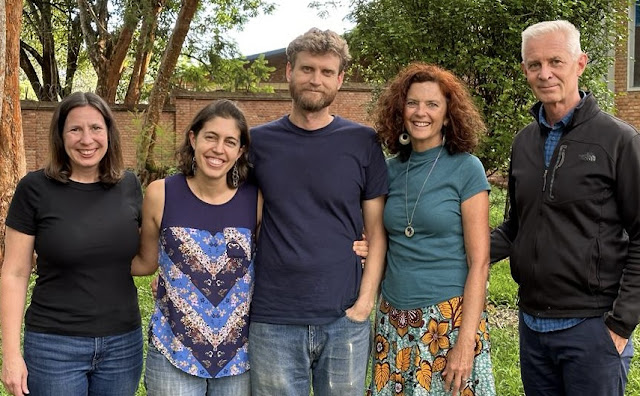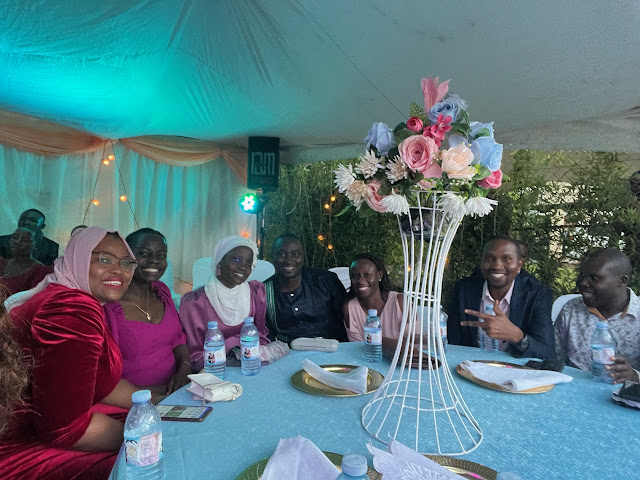Monday, October 30, 2023
The paradox of lament and hope: to Burundi and back
Saturday, October 14, 2023
Two trips, two countries, 30 years: in the wilderness leaning into grace
Thirty years ago today, we touched down in Entebbe with 8-month old Luke and our trunks. Those were the days before cell phones or internet, so when no one met us at the airport, we sat on those trunks on the curb for a couple of hours plotting what to do next. Swarms of lake flies surrounded us and I envisioned them being malarious mosquitoes that might end my baby's life before we even found our place. We knew the only way to make a phone call out of the country was a phone booth in the Sheraton Hotel about an hour away, but by the time we were ready to hire a taxi to find it, John Wilson Atwooki pulled up in a truck. The family who had planned to meet us was all sick at the Church of Uganda guest house in the capital, and he had been deputised to take us there.
And so the themes were set for the last thirty years. Atwooki has continued his occassional timely rescues (just a few months ago he saved us with a broken down car), we have continued to be blessed by the Church of Uganda (which just this year established a diocese IN BUNDIBUGYO and the new Bishop is speaking at CSB tomorrow!!), sicknesses both tropical and typical continue to throw up many of the day to day barriers to our plans (already consulted on one sick kid this morning, and exchanging emails with a family that has to travel for extra work up and care), and we continue to stumble through new travel experiences where we're a bit lost and dependent upon the kindness of others and the grace of God.
This past week, Congo (DRC).
Actually, more than 35 years ago, we had formed a team of college friends in America to go to eastern Congo to an area that had been identified by other missions as needing Bible translation, and had almost no church presence or health care. . . .but in the process of trying to get there we learned that the Babwisi of Bundibugyo were related to the Congo tribe over the border, spoke that same unwritten language, and that Serge had started to work in church and health on this side and needed us to join in. So we did. Our Uganda team has continued to care for patients and refugees who cross the border, and enfold church leaders from Congo in training, and about 5 years ago we added a team in Nyankunde to Serge. Between insecurity there, COVID border closures, my accident, and the strain of life, we hadn't visited that team in too long. Last month when we were in Kampala we stopped in the Congo embassy and paid for visas so we could make a visit in October.
Can you see our boat waiting? Note the photos below of the process ..
Bunia is only 70 miles as the crow flies from our home in Nyahuka. But that's 70 miles of no real passable roads and of villages frequented by rebel groups, so it's not easy for us to get there. We've gone by a circuitous road route in the past (150 miles), crossed the Semiliki in a little canoe to meet a MAF plane once, flown from Entebbe into Bunia too. But recently a couple of small companies started running a "high speed ferry" (a 20 ish foot long boat with bench seating in a glassed-in central area and a motor that crosses in about 1.5 hours) across Lake Albert. Our team leaders, the LaRochelles, tried it out, and it sounded so much easier than driving 8 hours to Entebbe to fly back across Uganda . . . so this trip we took the boat too. Long day into a short story, we haven't learned a LOT in 30 years. . . .once again the timing was ambiguous, finding the right people and procedures tedious, the departure point in Uganda is about 2 hours from us and the arrival point in Congo nearly 2 hours from our team, so it's still an all-day effort. But all went well. We moved with only small daypacks and our visas, and were well cared for by our team.
The main highlight of 5+ days in Congo is the Congolese. For a people who have known some of the worst colonial injustice, some of the most intractable and devastating war, and some of the most lethal diseases (King Leopold, Mobutu, and Ebola are all pretty rough but accurate words for Congo), the atmosphere in person is incredibly welcoming. We had six formal meetings with partners, and without fail they thanked our team for expressing the solidarity of presence and the practicality of love, and asked us to stay. We shared meals and toured camps and hospitals and listened and prayed.
The second highlight was the team. The LaRochelles (in about 2015) and the Staffords (in about 2020) came as Samaritan's Purse post-residents to Nyankunde and in spite of multiple evacuations and sorrows remain committed to blessing the people of Congo. They live in a hard place, difficult to access, with little capacity to share the work loads or find respite. But they both carry a strong vision for the world's good and God's glory, for restoring all things in partnership with Jesus who is making all things new. Inspiring words that obscure the hourly reality of a jolting unpaved road, unpredictable access to water or power, the lurking threat of skirmishes between armed groups, hungry kids and patients in advanced stages of problems that should have been addressed months or years before.
One of our meetings opened with a Congolese security advisor saying "you know, Congo is a conflict zone." One of the driving urgencies of our visit was to assess the complex interplay of a hundred tribally based militias, a couple of larger international rebel groups, a national army, the UN's long and less-effective-than-hoped-for peacekeeping mission which the DRC government has asked to draw to a close, thousands of people displaced from home, upcoming national elections in December . . . all as a background to our faith-based NGO and a few others as well as western government-funded aid trying to forge some safety nets.
In this world you will have trouble, Jesus said. The DRC would not dispute that summary of life. But be of good cheer, I have overcome the world, Jesus concluded. Over and over God leads people into wilderness to lovingly teach them to lean on grace. You can pray for our team's stamina to keep pouring out for the needs of Congo, to keep living the hard story of the Gospel. And pray for us and other leaders to wisely embrace a holistic, long-term view of bringing hope into that place.
This week the DRC might not even seem like an important story in light of rumbling horrible aggression in the Middle East, Europe, elsewhere. God holds all these tears in a bottle, cares for every sparrow that falls. Deaths in the last year or last week, compared to USA losses in 2001:
DRCongo civilians in Ituri/North Kivu killed by rebel militias this year 1,800 (6 million in 20 yrs)
Ukrainian civilians killed in Russian invasion 9,614 (military combatant numbers too obscured)
Israeli and Palestinian civilians killed in this week's attacks 2,300 and climbing
USA civilians killed in 9-11 attacks 2,977 people
USA civilians killed annually by guns (both suicide and personal aggression) 48,000
We all need the good news, that love is stronger than death.
Come Lord Jesus.
Sunday, October 01, 2023
On being a peg
No matter how many times I read the Bible, there are always new phrases that pop out. One day this week the lectionary assigned Ezra 9, and as the prophet laments the state of exile and failure he says in verse 8 says that for a little while grace has been shown to give us a peg in the holy place. A tent-peg, a pin that holds the temporary shelter anchored in a storm.
That captures some picture of what we are here. Not super strong or beautiful or famous, but still a reliable little wedge that holds on in the muddy realities of life.
This week back after the glories of the mountaintops (see previous post) has been a challenging pace of problems, not unexpected after a few weeks of deferred engagement. But in the middle of things falling apart we had two full days of celebration. On Thursday, Dr. Isaiah Kule married Masika Emily. Isaiah entered CSB as an orphan and graduated in Caleb and John's class, his determination and good will catching the eye of Dr. Travis back then who advocated we include him in the Dr. Jonah Kule scholarship fund for medical school. He came back after graduation and worked on the paediatric and neonatal wards with me here in Bundibugyo until he became convinced he needed to do a Paeds residency, which we also sponsored (along with some government help). He's just finishing his final thesis project to graduate with that master's degree (residency in Africa) and decided this was the time to marry Emily (whom he went to university with, she's a pharmacist) in the church. Isaiah gathered a wide net of support for this huge party, not just us but the CSB alumni, the hospital, the mission, his residency colleagues, his uncles, etc. His integrity shines, and his joyful face through the many hours of the ceremonies and celebration. We pray that he and Emily have a partnership to pour into the neediest places in this country with their lives and skills.
On Saturday, the Christ School candidates party pulled us into another day of music, dance, speeches, food, and hope. The Senior Four and Senior Six classes will begin intensive weeks of exams, sitting for 3-4 hour papers every day or two in many subjects. There is no "graduation" with a diploma, because everything about their future comes from the exam results which won't be released until early 2024. So before the gruelling testing period each year, the kids get a day to dress up and dream big.
On both these occasions we are the only foreigners and probably among less than a handful of people over age 60. It's not our party. . . . and yet we sense that our presence brings that tent peg anchor of stability that the young people seek. We've been around their lives since their birth (longer) and so represent continuity and consistency, a steady foundation in a changing world. We also represent being seen by distant places in spite of living at the end of the road. And we try to represent the loving connecting community of God's family that transcends age and ethnicity.
So here's to being old tent pegs! Prayers that we can stand firm.





























.jpeg)